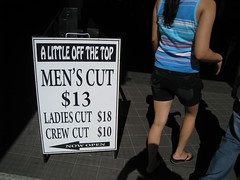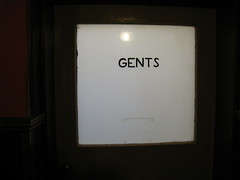Where have all the women gone?
It has become common for facilities, products and services to be described as available for "ladies" and "men". Those who recall a former era know that adult humans were classified as "ladies" and "gentlemen" on the one hand and "men and "women" on the other.
What has happened?
It has become common for facilities, products and services to be described as available for "ladies" and "men". Those who recall a former era know that adult humans were classified as "ladies" and "gentlemen" on the one hand and "men and "women" on the other. What has happened?
 Perhaps, for reasons I don't understand, there's conspiracy to strike the word "woman" from the English language.
Perhaps, for reasons I don't understand, there's conspiracy to strike the word "woman" from the English language.
Another example: there are any number of shoe stores in Sydney that sell men's shoes and (no, not women's shoes), but ladies'. The same is true of public toilets: they provide no place to pee for women – or for gentlemen, only for ladies and men. Presumably chicks and girls smarten themselves up before venturing into ladies' toilets, while gentlemen are required to doff their waistcoats and ties. Nobody ever mentions what to do about boys – except when it comes to rugby league players:
Renewed calls to ban players from drink as crisis deepens
Daniel Lane | March 8, 2009
FORMER NSW Origin coach Phil Gould has repeated his call for players to swear off alcohol for the term of their NRL contracts after a week that has left the code reeling.
Last September Gould stunned the league community when he wrote in his Sun-Herald column it was time to ban the booze after a string of alcohol-fuelled atrocities.
The code was yesterday rocked by the revelation its pin-up boy, Manly fullback Brett Stewart, was questioned by police after a teenager alleged she was sexually assaulted in the stairwell of a Manly apartment block.
The incident is alleged to have occurred after a Sea Eagles team function at the Manly Wharf Hotel. Forward Anthony Watmough was accused of slapping a club sponsor at the same event.
If that's what boys do, then, I'm with Maurice Chevalier.
In that make-believe Paris of 1959, girls eventually turned into ladies. Maurice Chevalier died in 1972 but probably the last gentleman standing in Australia is Pierpont. A web search finds no gentlemen's public toilets in Australia so presumably Pierpont has an elastic bladder that serves him until he returns home.
The question here is, does this change signify a shift in the battle of the sexes, after James Thurber characterised it as "the nameless little man's fright as he stood before the house that looked to him like a great, crouching wife".
 Or is it simply a value-free case of evolution in use of the English language? Is the new standard vernacular "guys" for men of all ages and "girls" for prepubescent human females, "chicks" from the age of puberty to somewhere in the late 20s, when it reverts to "girls" again for the rest of their lives?
Or is it simply a value-free case of evolution in use of the English language? Is the new standard vernacular "guys" for men of all ages and "girls" for prepubescent human females, "chicks" from the age of puberty to somewhere in the late 20s, when it reverts to "girls" again for the rest of their lives?
Or is it in fact a consequence of the Women's Liberation Movement – which has so liberated women that they have found better places to be, than here amongst Australian men?
If that is the case, who buys ladies' shoes, and who uses ladies' toilets? And where do gentlemen go when they are caught short?
Picture 2: A nostalgic reminder of a bygone era?














Crystal N
March 23, 2009 at 10:56 am
Maybe it’s not women disappearing, but gents
I'm not so sure that the word "woman" is disappearing, as much as morphing into a dichotomy of terms that convey either total disrespect (eg "ho") or high and often unrealistic expectations ("ladies"), with very little in between. Personally, I think a lot of music clips – especially rap ones – have a lot to answer for! In the case of the shoe store, though, you'll probably find that it's more an excuse to charge up-market prices by positioning their product as having a certain level of class than anything else!
In contrast, "men" seems to have moved away from any standards-based terms like "gentlemen". I don't think it's actually women that are disappearing, but, as you point out, the idea of a gentleman is definitely seen as a relic of another age… Most of the women I know would just about fall over in shock if a male companion opened doors and the like for them.
It's sad, really, but only part of a bigger trend of declining standards of behaviour that's becoming noticeable everywhere. I'd like to see discipline, respect and authority restored to where they should be in our culture, but it's not going to be an easy or quick fix after years of undermining the concepts.
Crystal N Woods
MikeM
March 23, 2009 at 12:16 pm
Is George Bernard Shaw the culprit?
It has been put to me that it was George Bernard Shaw rather than Maurice Chevalier who was responsible for the disappearance of women and rise of ladies. In his play, Pygmalion, he described how linguistics professor Henry Higgins hoisted flower girl Eliza Doolittle out of the gutter and made her into a lady. This message was reinforced by the hit musical, My Fair Lady, based on Shaw's play.
Takeaway message: any woman, no matter how mean her circumstance, could become a lady!
Remember the magical scene in the film starring Julie Andrews, where the flower girl suddenly "got it"? (with subtitles for the benefit of any Spanish speakers)
Like that scene (where the singing voice was not that of Andrews at all but of Marni Nixon), My Fair Lady seriously misrepresented Shaw's message.
Shaw writes, in his Sequel to the play:
In Shaw's story, Eliza married Freddie and together they set up a flower shop. While Freddie knew nothing worthwhile to help the business they both eventually learned and prospered. So the makeover to a lady did not last, and the young gentleman was reduced to being simply a man.
I'm not sure what to make of Crystal's comment, "Most of the women I know would just about fall over in shock if a male companion opened doors and the like for them." People I know don't make a big deal about opening doors for each other but convey general respect. If you can open or hold open a door for someone (or pick up a dropped parcel or walking stick) gender doesn't really come into it.
Respect for authority is less than it used to be, but I think rightly so. Although it does not always win, I support a view that says if you tell us that is what we have to do, show us evidence that supports your position. (I am thinking as a specific example of the Conroy plan to censor the internet.)
Crystal, perhaps you can give us specific examples of your concerns.
MikeM knows where the best places are to occasionally buy a bunch of flowers for his wife.